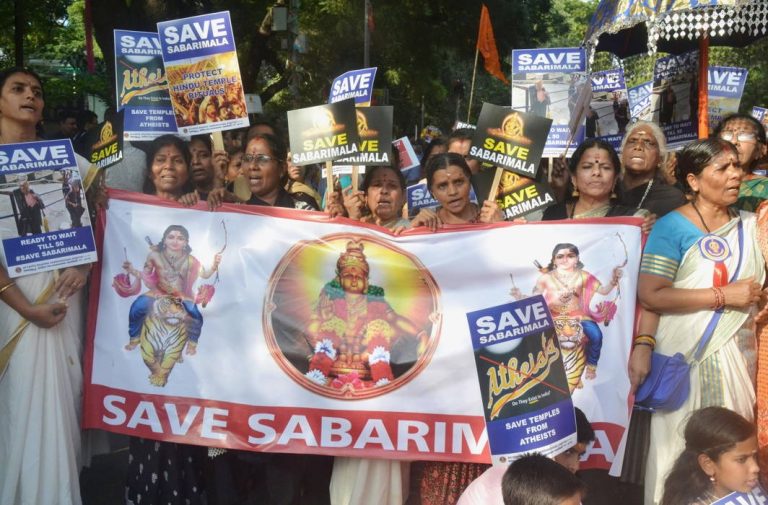
The Supreme Court, on Thursday, decided to refer the 65 review and writ petitions challenging the entry of women of all ages into Sabarimala temple in Kerala, to a larger, seven -judge bench.
A five-judge Constitution bench, headed by Chief Justice of India Ranjan Gogoi who demits office on Saturday, against its 2018 verdict, which overturned a centuries old tradition and allowed women of all ages to pray at Sabarimala. Hitherto, the place was off limits for women of menstruating age. The review petitions have thus been kept pending and a larger bench to be constituted by the CJI-designate S A Bobde hear the entire case once again. Today’s was a 3:2 majority verdict with CJI Ranjan Gogoi and Justices Khanwilkar and Indu Malhotra ruling in favour of sending the petitions to a larger bench while Justices RF Nariman and DY Chandrachud dissented.
The verdict coming as it does just three days before the annual pilgrimage season begins in the temple of Lord Ayyappa nestled in the hills of the western ghats has sent the administration and the police in Kerala into a tizzy. The BJP which opposed the entry of women into the temple said the since the apex court has sent the matter to a larger bench, the government should not utilise the opportunity to send women into the temple, as it did last year when under cover of darkness, the Marxist led government sent a couple of party sympathisers into the temple. What followed was violence on an unprecedented scale across the state. The political fallout of the case hit the state Left Front government which was battered in the Lok Sabha elections in May this year. Taking no chances, the police have upped their vigil to deal with potential law and order situations. Police chief Loknath Behera said stringent action will be taken against those who take law into their own hands.
In the apex court, the CJI Gogoi said entry of women into places of worship is not limited to this temple, but many similar issues come into play as well, like the entry of Muslim women into mosques, the entry of Parsi women who married non-Parsis into the tower of silence, female genital mutilation in the Dawoodi Bohra community, and others. The court said that these too need to be referred to a higher bench.
Dissenting with the majority judgment, Justices RF Nariman and DY Chandrachud stood their ground and said the temple should be open for all, including women of all ages. They said the issue of entry of women into mosques and could be considered by 7-judge bench. “Endeavour of the petitioner is to revive the debate on what is an integral part of the religion. Both sections of the same religious group have the right to propagate practices of themselves. Faith perceived by one group is not the same as another,” the CJI said.
The 65 petitions considered by the SC included 55 review petitions and four writ petitions.
Timeline
1991: the ban on the women’s entry into the temple was first challenged and the Kerala High Court upheld the ban.
2006: Indian Young Lawyers Association filed a petition in the SC, opposing the practice and seeking to lift the ban.
2007: The then LDF-led government told the court it favoured the entry of women into the temple. In 2016, the matter came up for hearing.
2017: The matter was referred to a three-judge constitution bench to note the arguments between the Kerala government and the TDB, which strongly opposed women’s entry.
July 2018: SC reserves the verdict after nine day .
September 28, 2018: In a historic judgment, the apex court lifted the ban on entry of women into the temple. In 4:1 verdict then Chief Justice Dipak Misra and Justices Khanwilkar, Justices Chandrachud and Nariman ruled in favour of women’s entry, Justice Indu Malhotra was the lone dissenter in the verdict.
Read the full judgment below:
https://drive.google.com/open?id=1iy8q0EfqCytLd9qL5ws_A22dwlfmPNeN
—India Legal Bureau

